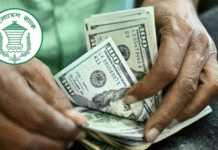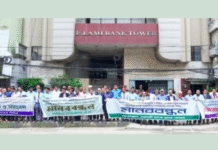Economic indicators take a downturn
 All the economic indicators of the country, save one, have taken a downward turn. There is no growth in export revenue and it is the same with imports. There is a significant revenue deficit. Despite the new law, there has been no increase in VAT collection either.
All the economic indicators of the country, save one, have taken a downward turn. There is no growth in export revenue and it is the same with imports. There is a significant revenue deficit. Despite the new law, there has been no increase in VAT collection either.
The only positive indicator is remittance from expatriates.
With the slump in revenue, the government is turning more and more towards borrowing. Private investment has been at a standstill for several years. Things are looking worse this fiscal. Private sector bank loans have decreased drastically, resulting in fewer LCs being opened for capital machinery and raw material imports.
Ironically, the bank loan defaults are doing well. They continue to receive all sorts of benefits and perks, though this has no impact on investments. And the share market has long been bearish.
There is fear of a global recession. The US-China trade war is pushing the world economy towards this recession. Economic growth in India has slowed to 4.5 per cent. The question now is whether Bangladesh’s economy will also see a slump after the spurt of rapid growth.
Executive director of Policy Research Institute (PRI) Ahsan H Mansur, speaking to Prothom Alo, said, “India’s economy has fallen into a hole and is making the hole deeper. Our indicators indicate we are headed in the same direction. Overseas remittance may have increased but the number of migrants has fallen. This remittance from abroad will also decrease. The overall economic uplift is not likely to last. We are falling into a hole too.”
First the good news
Many women migrant workers, tortured in Saudi Arabia, are returning home. Despite reports of their horrendous experiences, remittance from abroad went up by 23 per cent in the first five months (July–October) of the current 2019-20 financial year. This was just 9 per cent in the corresponding period last fiscal. This is having a positive impact on growth.
The taka exchange rate against the dollar was artificially kept steady for a few years. China has devalued its currency after the onset of the US-China trade war. Other countries followed in order to survive the competition. In Bangladesh the government decided to provide incentive to its expatriates instead of devaluing the taka. Economists and entrepreneurs, however, feel that it would have been more beneficial for the export sector and almost all other sectors if the taka was devalued. Under pressure, Bangladesh Bank is now looking towards a devaluation of the taka.
-Fall in government earnings-
The export sector is the biggest source of foreign exchange in the country, yet this sector is seeing negative growth. Export earnings in the first five months of the current fiscal stood at around USD 15.78 billion, that is 12.50 per cent short of target and 7.59 per cent less than what is was in the corresponding period of the last fiscal. The last time Bangladesh had seen negative export growth was in the 2001-02 financial year.
There is worse news for the export sector. Vietnam is overtaking Bangladesh in the readymade garment export sector. The Bangladesh chunk is 6.2 per cent of the top 10 exporters of the world and Vietnam’s is 6.2 per cent. And now it is exceeding Bangladesh in garment exports. Also due to the US-China trade war, many US importers are turning from China to Vietnam. Chinese investors too are entering the Vietnamese market. Bangladesh is not benefitting from the trade war. It has also failed to cut down on the costs of doing business.
The revenue sector is another headache for the government. The finance ministry, with its massive budget, is now in dire straits over revenue collection. The overall revenue deficit in the first four months (July-September) of this financial year is about TK 202.2 billion. Growth in these four months is just over 4 per cent, yet the growth target has been set at 45 per cent higher than last fiscal.
Earnings have fallen in the three main revenue areas of the National Board of Revenue (NBR). These are duty and tariff in imports and exports, VAT at the local level, and income tax.
The new VAT law has come into effect this fiscal. It was apparently prepared with much care, but now is seen to be riddled with loopholes. VAT collection has fallen.
Member of NBR’s income tax department, Kanon Kumar Roy, told Prothom Alo that revenue is always short at the beginning of the year. However, he said, NBR has taken several measures to prevent tax evasion and to increase revenue earnings.
Meanwhile, according to Bangladesh Bank, there has been no growth in import expenditure in the first three months till September in the current financial year. It has fallen by 2.5 per cent compared to that of the corresponding period of the last financial year. LC settlement has fallen by 12.5 per cent for capital machinery import and 6.5 per cent for raw material import. Experts feel that business has slowed down due to the fall in exports and imports as well as a recession in the domestic economy.
Investment still stagnant
According to Bangladesh Bank, the private sector has not borrowed significantly from banks in the first three months of the current fiscal. The growth in this area has only been .64 per cent. The government set a 9 and 6 per cent interest rate on interest and deposits respectively, but that has not come into effect. Deposits have dropped in the banks and interest on loans remains high. Default loans have also increased. The investment sector is not likely to perk up any time soon.
-Expenditure and government loans increase-
The government faces huge expenditure. It has presented a massive budget. Though there has been a revenue deficit from the outset of the financial year, the government’s expenditure has not been cut. This has increased the government’s borrowing, creating a fresh crisis. The lack of security in investments has driven up savings certificate sales. Savings certificates have higher interest rates, attracting the general public.
Savings certificate sales in the first four months of the current 2019-20 fiscal has reached Tk 55 billion, less than that of the corresponding period last fiscal when this reached around Tk 180 billion. Various regulations have driven down the sales, it is felt. This may lessen the government’s liabilities, but may also drive up the government’s borrowing from the banking sector to meet the budget deficit. The more the government borrows from the banking sector, the less there is scope for the private sector to do so. This will give rise to yet another crisis in investment.
Speaking about the overall situation, economist Zahid Hossain told Prothom Alo that all indicators are looking downwards except for overseas remittance from expatriates. Revenue, exports, loans, nothing was in a good shape. Previously there had never been such a bad state of all indicators at the same time. The decrease of imports in capital machinery indicates that investment is not growing. Significant reforms are required to bring in investment. Cash and tax incentives will not dispel the structural problems.
The economist went on to say that the government is not admitting that the economy’s indicators have been bad from the start of the financial year. If they admitted the problems, then they could aim at a solution. The finance ministry and the general economic division (GED) of the planning commission are saying that these problems are temporary and will soon pass. That is where the problem lies.
* This report appeared in the print edition of Prothom Alo has has been rewritten here in English by Ayesha Kabir









